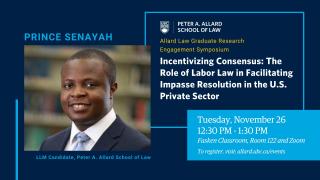Event Description
The National Labor Relations Act (NLRA) requires private sector employers to bargain in good faith with their employees’ duly recognized unions on mandatory subjects of collective bargaining, i.e., subjects involving wages, hours, and terms and conditions of employment. The Act, however, neither requires bargaining parties to achieve consensus on such issues, nor prescribes conciliatory mechanisms for achieving consensus once collective bargaining results in a bargaining impasse. Attempts by the NLRB and U.S. federal courts to address the gap created by the non-availability of Congressionally endorsed conciliatory mechanisms have culminated in what experts now call the doctrine of Implementation upon Impasse. This presentation empirically analyzes the doctrine’s impact on collective bargaining outcomes and strategies, and among other things, ascertains whether the doctrine is facilitative of consensus building.
Prince Senayah is a Master of Laws (Research LLM) candidate at the Peter A. Allard School of Law. Before joining Allard law, Prince obtained a JD with a Certificate of Concentration with Distinction in Labor and Employment Law from the University of Toledo School of Law. He was called to the state bar of Ohio in 2020. Prince’s research interests include labor and employment law, labor law theory, contract law, and law and sociology.
Speaker
- Graduate Programs
- General Public
- All Students
- Alumni
- Faculty
- Graduate Students
- JD
- Staff
- Research Talks

